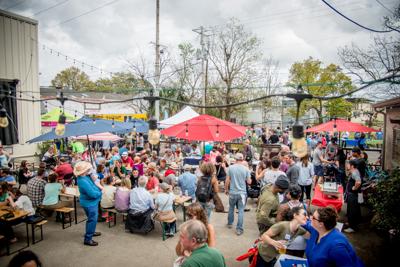The small, local breweries that have recently remade the New Orleans beer scene can serve only beer in their taprooms — no wine, no liquor.
But as this new niche has developed around town, it’s clear they are serving different kinds of roles along the way.
I’ve shopped art markets at brewery beer gardens. I've sampled from food trucks and pop-ups and eaten from in-house kitchens that give the city’s best bar food a run for its money — namely, McClure’s Barbecue at NOLA Brewing, Stokehold at Port Orleans Brewing.
I’ve attended neighborhood meetings and fundraisers and I’ve even witnessed a yoga class in progress between the sacks of grain and stacks of kegs.
I’ve heard people singing “Happy Birthday” and seen the cake placed before an 8-year-old. Taprooms are open to all ages, which is probably fun for kids. It is without a doubt a game changer for young parents yearning to reconnect with their own friends.
Have enough pints in brewery taprooms and eventually you’ll hear someone describe them as the “third space” — not home, not work, that third space for social and community life.
When Courtney and Garrett Bogden visited New Orleans last week from their home in Lancaster, Pennsylvania, their itinerary included some touri…
Bars and restaurants are part of this third space equation too. But as a new corner of the city's social landscape takes root in taprooms, the breweries have a careful line to toe.
Selling brew directly (and reaping its full profit) is part of what keeps them viable, and has enabled the local industry’s renaissance.
But the primary customer for most breweries remains down the three-tier system — the restaurants and bars and stores that buy their brew from distributors and sell it to their own customers. There are limits on how much Louisiana breweries can sell direct, along with how they can market themselves and operate, part of a raft of rules worked through regulators and legislators last year.
Still, there has been grumbling elsewhere around the larger American beer industry about the brewery taprooms cutting into the bar business. Can New Orleans, where modern craft brewing is still a niche market, handle this dynamic?
Maybe New Orleans is better equipped than most, culturally speaking, to navigate the changing supply stream. This city understands the “third space” notion intuitively, without the urban planning lingo. It runs through our robust festival calendar and street parades, our social rites of football season, and its spirit basically commandeers the city during Carnival.
They satisfy different needs, grow from different traditions and are orchestrated by different players. As craft breweries build back a homegrown industry in this city, they are not just serving beer but making it, manufacturing part of the New Orleans cultural economy. In the social space of taprooms and beer gardens, they have a chance to add a new layer.
Beer does not have a season. But you might not know that to look at the New Orleans calendar this fall.
The National Fried Chicken Festival was built on the idea that its namesake bird has a universal appeal. After all, fried chicken has forged a…











